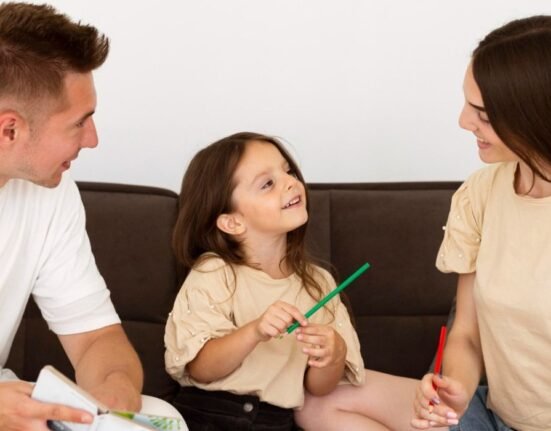Some happy and cheerful kids; some anxious toddlers; some crying & screaming; some droning and some watching silently with submissiveness, eyes filled with tears; some holding the hand of their parents tightly and forcefully, Children distressed by separation anxiety; parents worried on seeing their children so agitated and suddenly we see a mother thrusts her little one into the arms of a teacher, who quickly walks away with the child; passers-by smile sympathetically, teachers roping in years of experience to best deal with distressed children- This scene is very common in all kindergarten schools, but a tough one for parents – their child’s first day at school!
We have all witnessed this at some point in our life and every parent is conditioned to think that this is normal and acceptable behaviour. But do you really think so???? It is not!!!
Going off to preschool or kindergarten is an important milestone for both parent and the child. This milestone is often anticipated with great excitement and joy, but also with lots of crying, uncertainty and heel-digging. It may be the first step for the child to go away from home or a transition to a new setting and friends. Every child is hesitant to go somewhere new and see people s/he has never met before. For children, the main source of anxiety around entering preschool is that they have absolutely no idea what to expect. Every kid spent their first 2-3 years learning the rules and routines of their family and they are completely unfamiliar with the new rules and routines they will encounter at school.

children accept and enjoy change more than others. But it’s not unusual for even the most “experienced” child to need some extra attention during the first day and week of school. Even the return to school after completing one level has its own excitements, pleasures and anxieties. Similarly, it is a major transition in the life of a parent. For parents, the main source of anxiety is worrying that their child will feel abandoned; leading to feelings of separation anxiety.
Almost all parents experience some nervousness and uncertainty, but it is important for parents to approach this transition in their own and their child’s life in a positive frame to help their child in this transition well. As a parent, one should recognize and manage their own feelings about their child’s progression. If parents are not aware about their own feeling or if they are unable to acknowledge them then it will be difficult for them to support their kid in approaching this life stage in a positive way. It is perfectly okay to seek help if needed, so that the child does not bounce off from their parent’s anxiety, stress or worry.
For a child, starting school is a significant shift from predominantly family time to, being away from the family for a full day or a part of the day for the first time. If the kid is the first child in the family to start school there is an added pressure in the new experience, and if he/she has an older siblings then we can’t just believe that it will be easy for the younger one. Experiences of the older child or what worked for him/her may not necessarily work for the younger one. Every child is different.
Research shows that from birth, a baby’s brain is programmed to attach itself to a caregiver and in most cases, to the mother. So, when a child is separated from the parents and is suddenly thrust into an unfamiliar environment, his primary safety instinct and alarm centre is activated. His brain forcefully sends signals, asking him to hold on to his parent (Daniel J. Siegel). This explains why the toddler clings to his parent and cries, when he is left at school for the first time.
Many times we notice that parents feel that their kid should start early without considering one vital question – Is my child ready? They start working towards getting their kid into preschool before the required developmental stage. A child should be socially and emotionally ready to part from her primary caregiver/ mother. As a parent, one should observe their child’s behavior and must ensure that the kid is emotionally ready for school.
To be sure about the readiness of the kid, parents can observe their interactions with other children at different social occasions and setting (at the local park, a birthday party, or in their neighborhood). If the child refuses to get off the mother’s lap and let go of their parent’s hand, then the kid is signaling that he/she is not ready to detach from parents. In such cases, it is important to respect your child feelings. It is perfectly alright to keep your child out of school for a term or a year, depending on the readiness of your child. It is an option one can exercise, if necessary!
If you plan in advance and follow a few simple steps, the day can be memorable in all the right ways.
Tips to help you and your child before school starts:
- Familiarise your child with the new environment. If possible arrange for a visit to the school before the starting of school. Meet his new teacher before school officially starts.
- Point out the positive aspects of starting school. It will be fun and she can make new friends.
- Ask your child about his/her feelings about school, friends, teachers, and new activities both the excitement and the concerns about starting school.
- Find out if there are other children from your neighbourhood who are starting school at the same time. Plan meet-ups with these children, so that your child sees familiar faces around when he starts.
- Let your child know what his schedule will be like. Tell him what time school begins and ends each day.
- Reassure your child that if any problems arise at school, you will be there to help resolve them.
- You can even practice. Learning how to get ready each morning for the school takes time and practice. It’s helpful to practice the steps before the actual first day. Pretend it’s a school day, and go through the steps of getting up, dressed, fed, and out the door.
- Get your child involved in the preparation process. It’s always fun to go out shopping for a few stuff together (like., School clothes, bag, stationary etc.) can make a child feel excited about the start of the year.
- Establish a new bed time- weeks ahead of time, start getting into the new routine so that the night before school is a lot easier. Put them to bed earlier each evening in preparation for school bedtime.
- Parents can even talk about their own memories. By Sharing your own school experience with your child makes them feel positive and trying to focus on the positive and be optimistic.

Preparation for schools can make parents anxious. As they are rushing to get things done. But you should try to avoid the chaos. Many researchers suggest that if parents stay peaceful, there’s a greater chance the kids will, too.
- Parents can ask teacher about the recommended amount of time for hanging out on the first day of preschool and then stick to it, watch the clock — and your kid — and then say goodbye. Remember to make your child know how you feel confident about leaving him/her at school and it is a safe place to be.
- We all wish for happy kids at drop-off, but sometimes things don’t go that way even if your child is sad after you have bid them goodbyes. You can ask a teacher for help and walking away from the situation allows the teacher and your child to work through what’s going on, unless you feel your child is a danger to herself or others.
- You should not sneak away. This might make your child more anxious if they find you suddenly disappear. Instead, you should develop a good-bye ritual. This could be anything you and your child decide on, (like, a special hug or handshake followed by a “See you later”).
- Once the big day has arrived, keep to the schedule, which will be easier if you have prepared as much as possible. “There’s nothing more anxiety-provoking than being rushed out the door, or, at the end of the day, being the last child waiting for parents to pick up them. Being on time to pick up your kid ensures and understands that Mommy and Daddy always come back and are trustworthy, building a bond that encourages healthy behavior and self-confidence in your kid.
- As a parent you should be consistent even if you see that your child is not feeling good or has had a bad first reaction to school please do not pull them out of the classroom or school. If you do so then you restrict your child an opportunity to learn how to work through negative feelings and sets a precedent of not having to face problems. Consistency is key when it comes to making preschool a part of your child’s new routine.
Having a first great day of school starts weeks ahead of time, but with these tips, your kids can have a stress-free and exciting first day of school. Good luck to all the parents!













Leave feedback about this